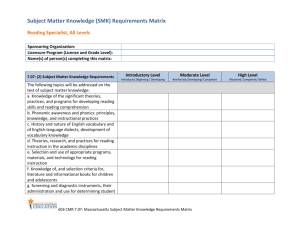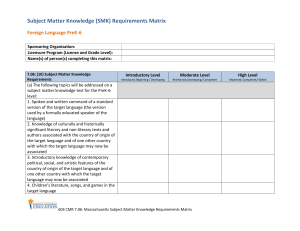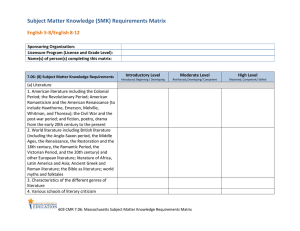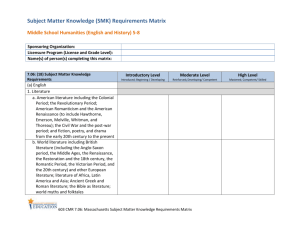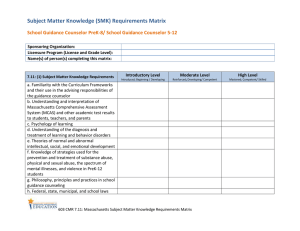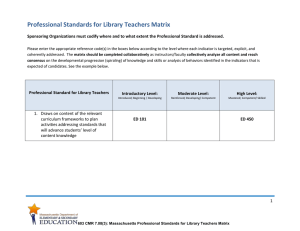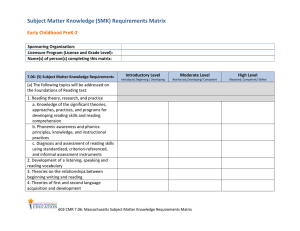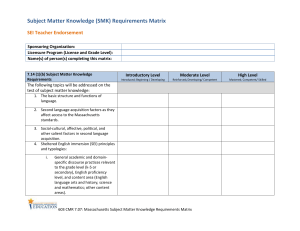Elementary1 6
advertisement
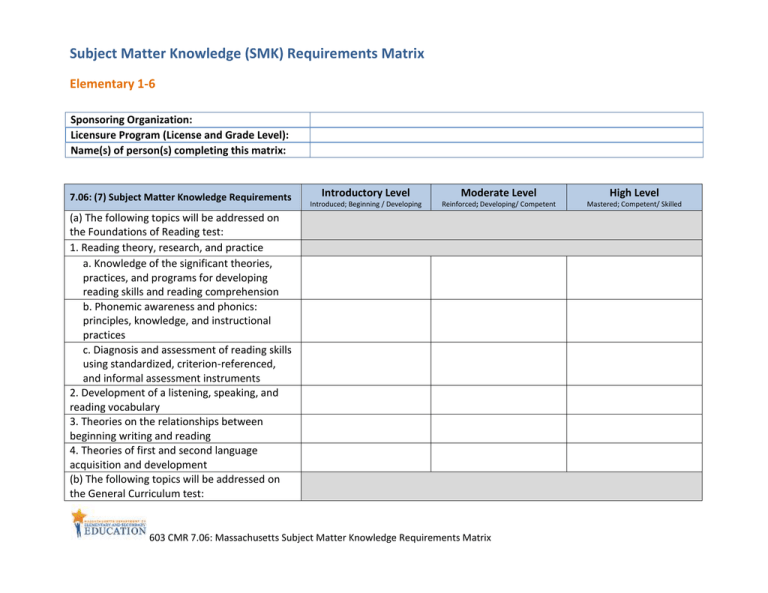
Subject Matter Knowledge (SMK) Requirements Matrix Elementary 1-6 Sponsoring Organization: Licensure Program (License and Grade Level): Name(s) of person(s) completing this matrix: 7.06: (7) Subject Matter Knowledge Requirements Introductory Level Moderate Level High Level Introduced; Beginning / Developing Reinforced; Developing/ Competent Mastered; Competent/ Skilled (a) The following topics will be addressed on the Foundations of Reading test: 1. Reading theory, research, and practice a. Knowledge of the significant theories, practices, and programs for developing reading skills and reading comprehension b. Phonemic awareness and phonics: principles, knowledge, and instructional practices c. Diagnosis and assessment of reading skills using standardized, criterion-referenced, and informal assessment instruments 2. Development of a listening, speaking, and reading vocabulary 3. Theories on the relationships between beginning writing and reading 4. Theories of first and second language acquisition and development (b) The following topics will be addressed on the General Curriculum test: 603 CMR 7.06: Massachusetts Subject Matter Knowledge Requirements Matrix 7.06: (7) Subject Matter Knowledge Requirements Introductory Level Moderate Level High Level Introduced; Beginning / Developing Reinforced; Developing/ Competent Mastered; Competent/ Skilled 1. English a. Children's and young adult literature b. Adult literature, classical and contemporary works c. Genres, literary elements, and literary techniques d. Nature, history, and structure of the English language: lexicon and grammar e. Approaches and practices for developing skill in using writing tools f. Writing process and formal elements of writing and composition 2. Mathematics a. Basic principles and concepts important for teaching elementary school mathematics in the following areas: i. Number and operations (the foundation of topics in 603 CMR 7.06 (7) (b) 2. a. ii. iv.) ii. Functions and algebra iii. Geometry and measurement iv. Statistics and probability b. Candidates shall demonstrate that they possess both fundamental computation skills and comprehensive, in-depth understanding of K-8 mathematics. They must demonstrate not only that they know how to do elementary mathematics, but that they understand and can explain to students, in multiple ways, why it makes 603 CMR 7.06: Massachusetts Subject Matter Knowledge Requirements Matrix 7.06: (7) Subject Matter Knowledge Requirements Introductory Level Moderate Level High Level Introduced; Beginning / Developing Reinforced; Developing/ Competent Mastered; Competent/ Skilled sense c. The Commissioner, in consultation with the Chancellor of Higher Education, shall issue guidelines for the scope and depth of knowledge expected in mathematics, described in 603 CMR 7.06 (7) (b) 2 a. and b. 3. History and Social Science a. Major developments and figures in Massachusetts and U.S. history from colonial times to the present b. Major developments and figures in world history, with stress on Western civilization c. Basic economic principles and concepts d. Basic geographical principles and concepts e. U.S. political principles, ideals, founding documents, institutions, and processes, their history and development 4. Science and Technology/Engineering a. Basic principles and concepts of the life sciences appropriate to the elementary school curriculum b. Basic principles and concepts of the physical sciences appropriate to the elementary school curriculum c. Principles and procedures of scientific inquiry d. History of major scientific and technological discoveries or inventions e. Safety issues related to science 603 CMR 7.06: Massachusetts Subject Matter Knowledge Requirements Matrix 7.06: (7) Subject Matter Knowledge Requirements Introductory Level Moderate Level High Level Introduced; Beginning / Developing Reinforced; Developing/ Competent Mastered; Competent/ Skilled investigations (c) The following topics shall be included in an approved program but will not be addressed on a written test of subject matter knowledge: 1. Science laboratory work 2. Child development a. Basic theories of cognitive, social, emotional, language, and physical development from childhood through adolescence b. Characteristics and instructional implications of moderately and severely disabling conditions 3. Basic principles and concepts in each of the visual and performing arts (art, music, drama/theater, dance) 4. Basic principles and practices in physical education 5. Basic principles and practices related to personal and family health 603 CMR 7.06: Massachusetts Subject Matter Knowledge Requirements Matrix
